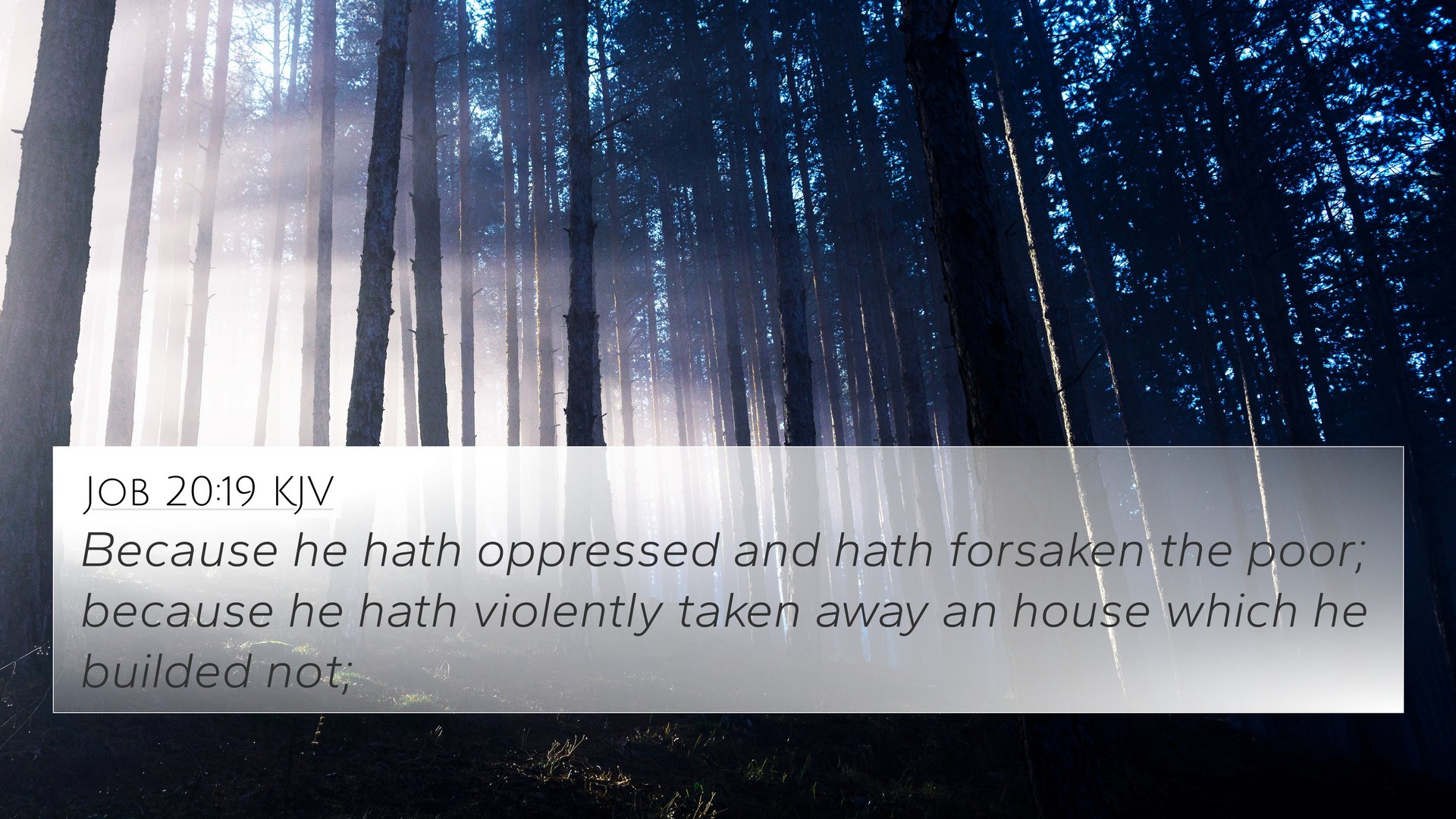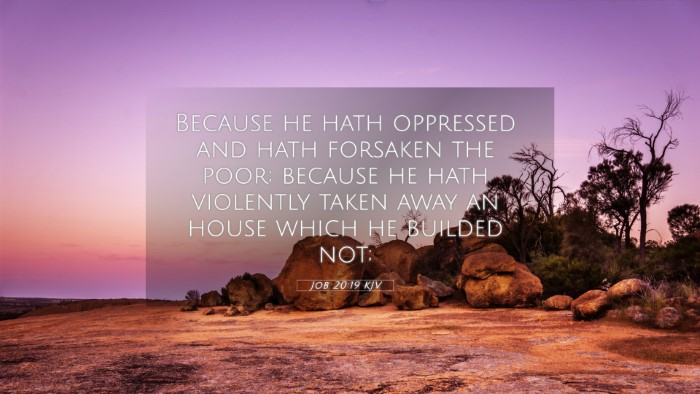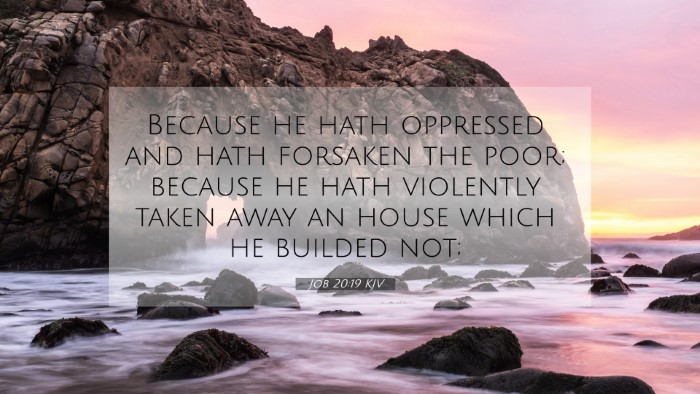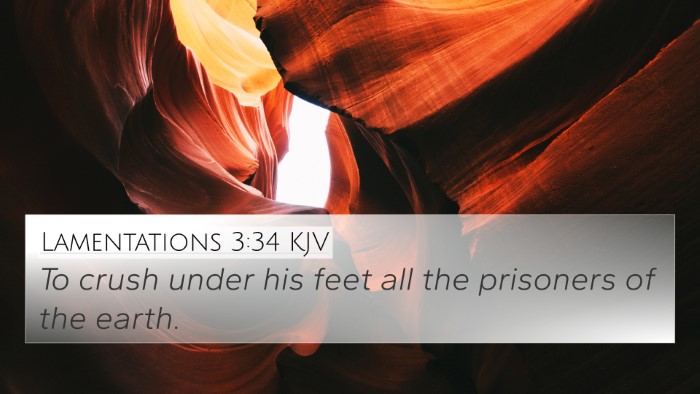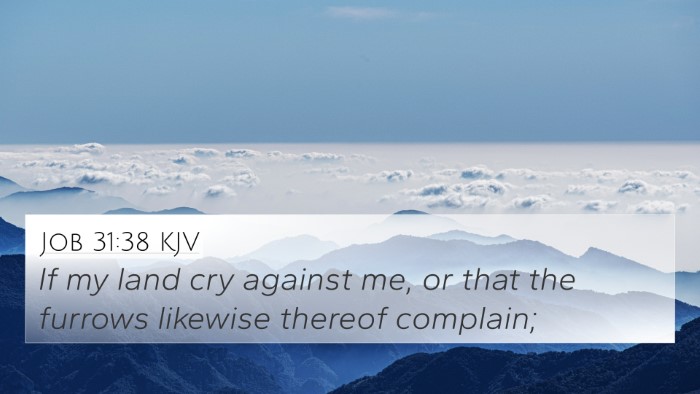Old Testament
Genesis Exodus Leviticus Numbers Deuteronomy Joshua Judges Ruth 1 Samuel 2 Samuel 1 Kings 2 Kings 1 Chronicles 2 Chronicles Ezra Nehemiah Esther Job Psalms Proverbs Ecclesiastes Song of Solomon Isaiah Jeremiah Lamentations Ezekiel Daniel Hosea Joel Amos Obadiah Jonah Micah Nahum Habakkuk Zephaniah Haggai Zechariah MalachiJob 20:19 Similar Verses
Job 20:19 Cross References
Because he hath oppressed and hath forsaken the poor; because he hath violently taken away an house which he builded not;
Uncover the Rich Themes and Topics of This Bible Verse
Listed below are the Bible themes associated with Job 20:19. We invite you to explore each theme to gain deeper insights into the Scriptures.
Job 20:19 Cross Reference Verses
This section features a detailed cross-reference designed to enrich your understanding of the Scriptures. Below, you will find carefully selected verses that echo the themes and teachings related to Job 20:19 KJV. Click on any image to explore detailed analyses of related Bible verses and uncover deeper theological insights.

Job 35:9 (KJV) »
By reason of the multitude of oppressions they make the oppressed to cry: they cry out by reason of the arm of the mighty.
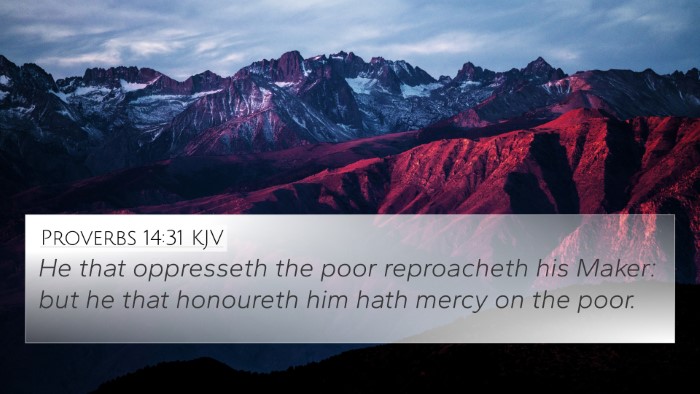
Proverbs 14:31 (KJV) »
He that oppresseth the poor reproacheth his Maker: but he that honoureth him hath mercy on the poor.
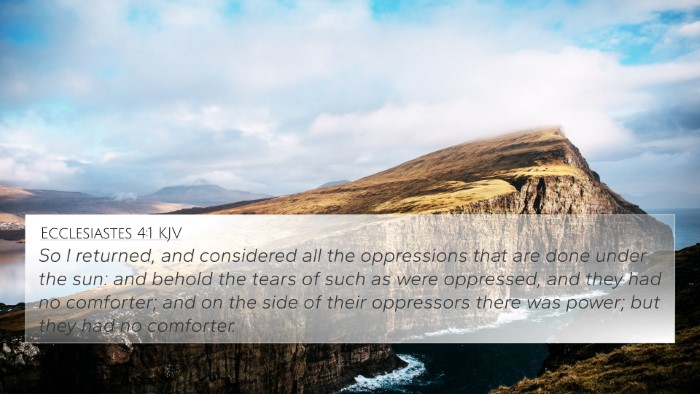
Ecclesiastes 4:1 (KJV) »
So I returned, and considered all the oppressions that are done under the sun: and behold the tears of such as were oppressed, and they had no comforter; and on the side of their oppressors there was power; but they had no comforter.
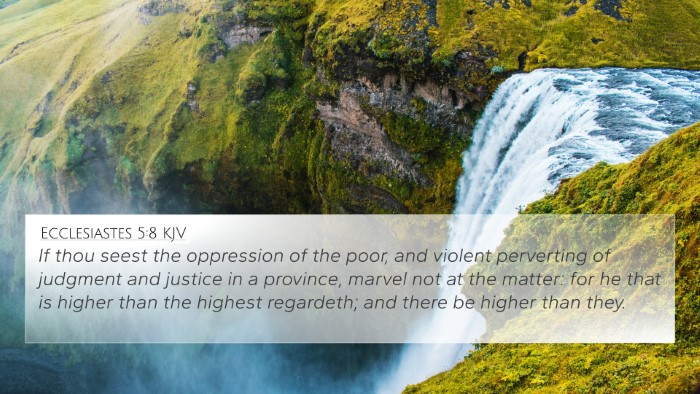
Ecclesiastes 5:8 (KJV) »
If thou seest the oppression of the poor, and violent perverting of judgment and justice in a province, marvel not at the matter: for he that is higher than the highest regardeth; and there be higher than they.
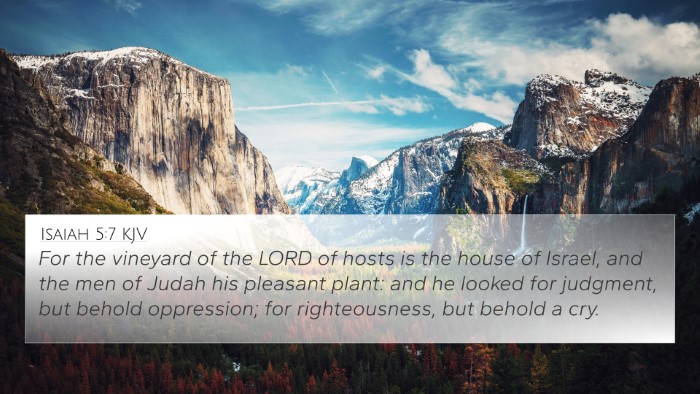
Isaiah 5:7 (KJV) »
For the vineyard of the LORD of hosts is the house of Israel, and the men of Judah his pleasant plant: and he looked for judgment, but behold oppression; for righteousness, but behold a cry.
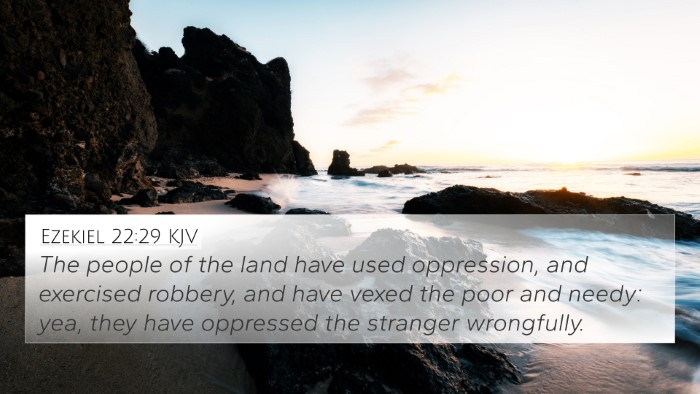
Ezekiel 22:29 (KJV) »
The people of the land have used oppression, and exercised robbery, and have vexed the poor and needy: yea, they have oppressed the stranger wrongfully.
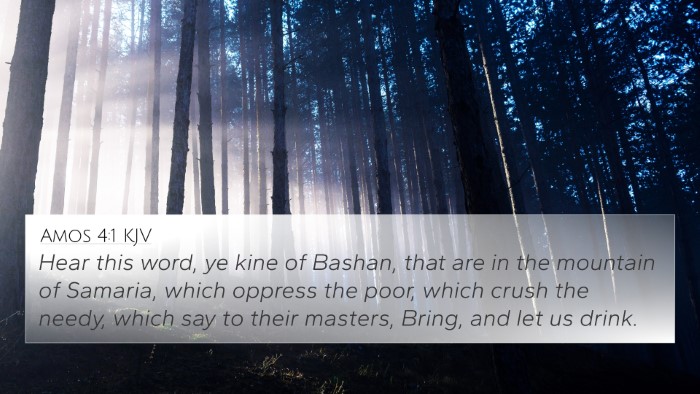
Amos 4:1 (KJV) »
Hear this word, ye kine of Bashan, that are in the mountain of Samaria, which oppress the poor, which crush the needy, which say to their masters, Bring, and let us drink.
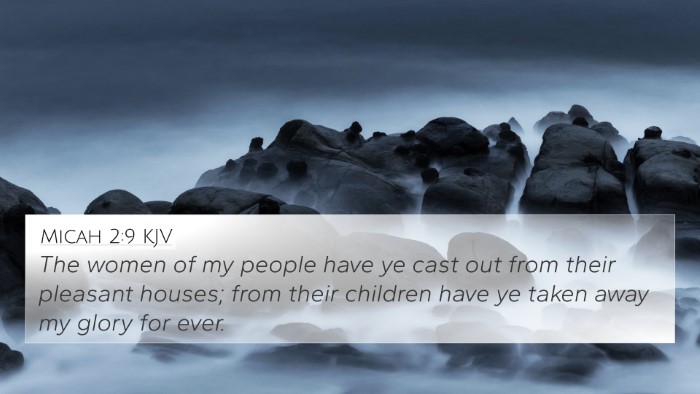
Micah 2:9 (KJV) »
The women of my people have ye cast out from their pleasant houses; from their children have ye taken away my glory for ever.
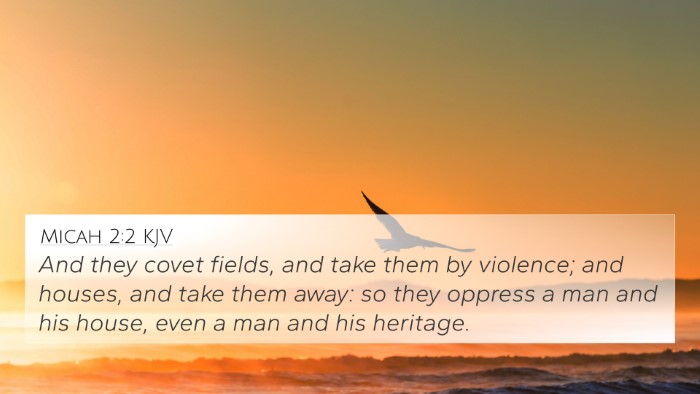
Micah 2:2 (KJV) »
And they covet fields, and take them by violence; and houses, and take them away: so they oppress a man and his house, even a man and his heritage.
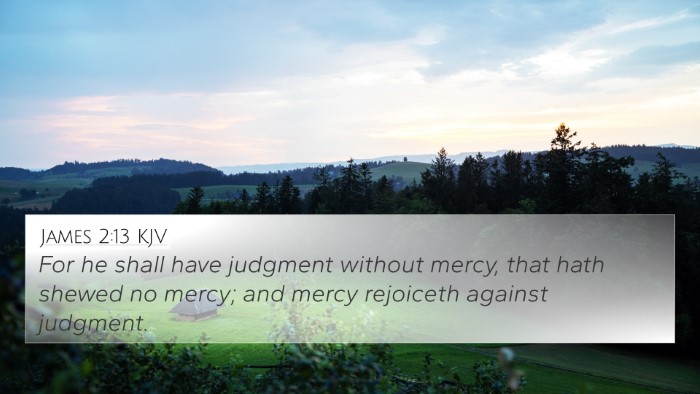
James 2:13 (KJV) »
For he shall have judgment without mercy, that hath shewed no mercy; and mercy rejoiceth against judgment.
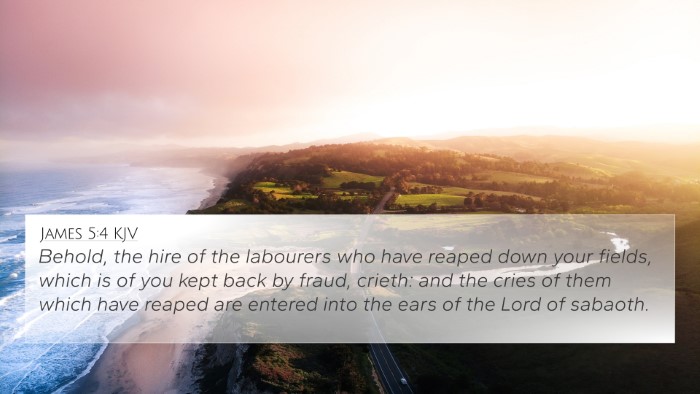
James 5:4 (KJV) »
Behold, the hire of the labourers who have reaped down your fields, which is of you kept back by fraud, crieth: and the cries of them which have reaped are entered into the ears of the Lord of sabaoth.
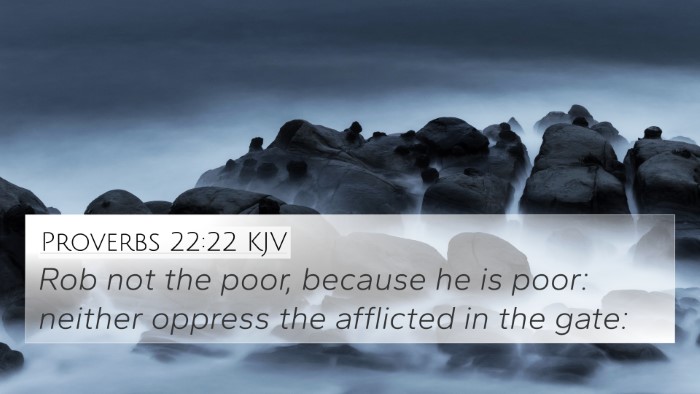
Proverbs 22:22 (KJV) »
Rob not the poor, because he is poor: neither oppress the afflicted in the gate:
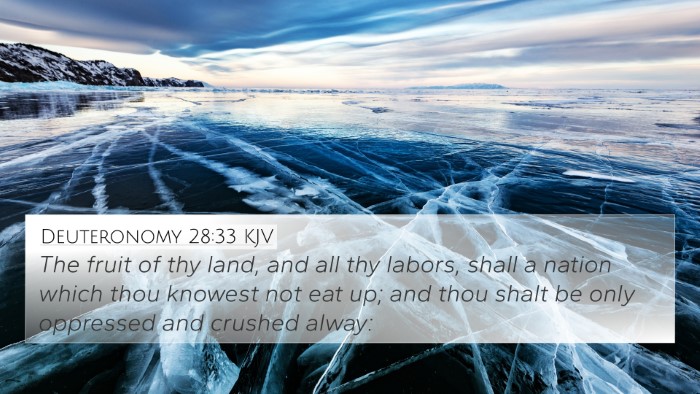
Deuteronomy 28:33 (KJV) »
The fruit of thy land, and all thy labors, shall a nation which thou knowest not eat up; and thou shalt be only oppressed and crushed alway:
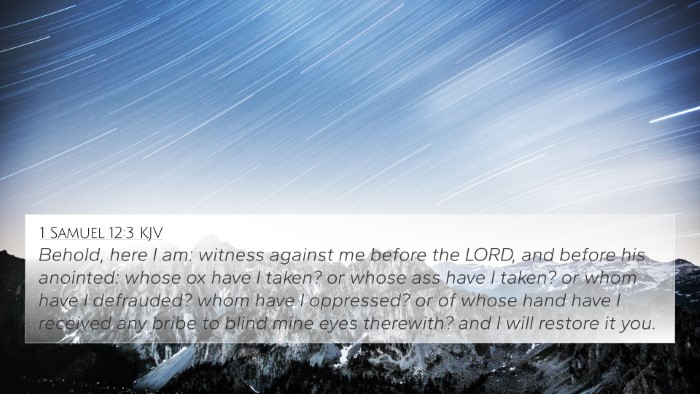
1 Samuel 12:3 (KJV) »
Behold, here I am: witness against me before the LORD, and before his anointed: whose ox have I taken? or whose ass have I taken? or whom have I defrauded? whom have I oppressed? or of whose hand have I received any bribe to blind mine eyes therewith? and I will restore it you.
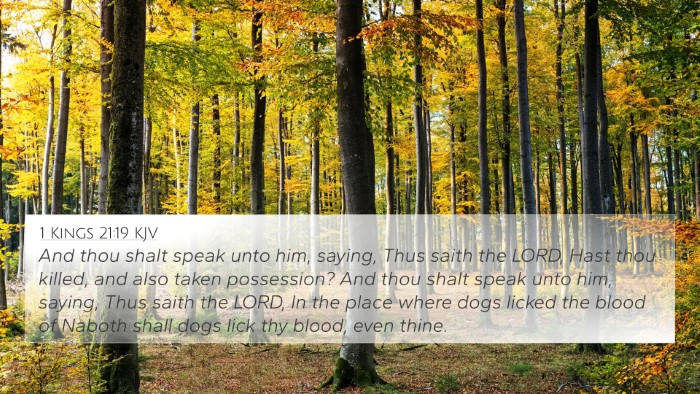
1 Kings 21:19 (KJV) »
And thou shalt speak unto him, saying, Thus saith the LORD, Hast thou killed, and also taken possession? And thou shalt speak unto him, saying, Thus saith the LORD, In the place where dogs licked the blood of Naboth shall dogs lick thy blood, even thine.
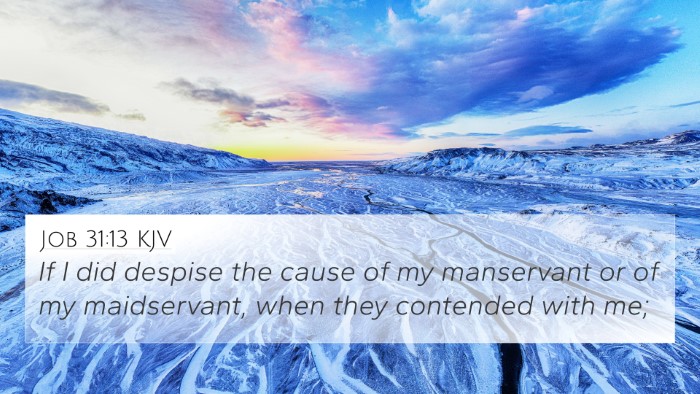
Job 31:13 (KJV) »
If I did despise the cause of my manservant or of my maidservant, when they contended with me;
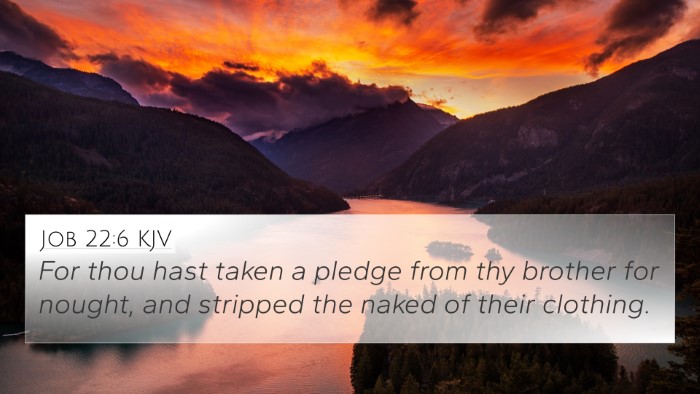
Job 22:6 (KJV) »
For thou hast taken a pledge from thy brother for nought, and stripped the naked of their clothing.
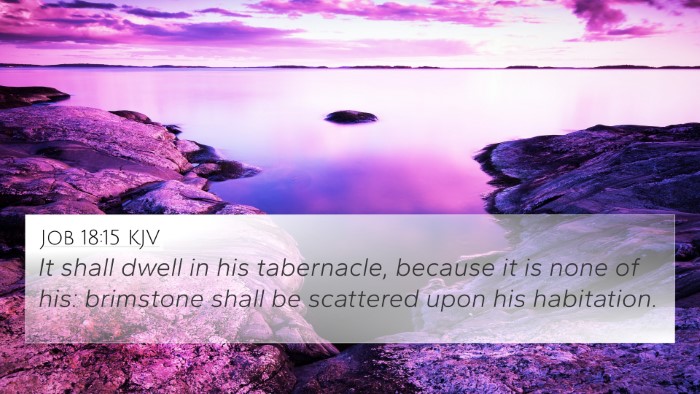
Job 18:15 (KJV) »
It shall dwell in his tabernacle, because it is none of his: brimstone shall be scattered upon his habitation.
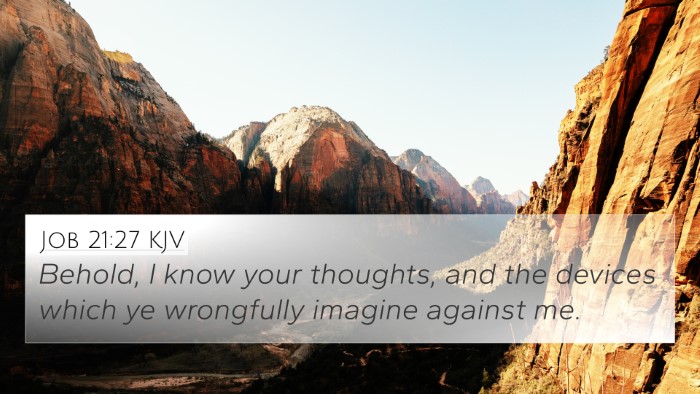
Job 21:27 (KJV) »
Behold, I know your thoughts, and the devices which ye wrongfully imagine against me.
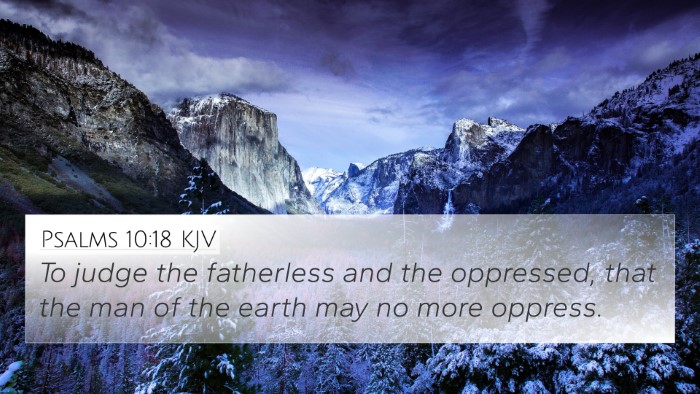
Psalms 10:18 (KJV) »
To judge the fatherless and the oppressed, that the man of the earth may no more oppress.
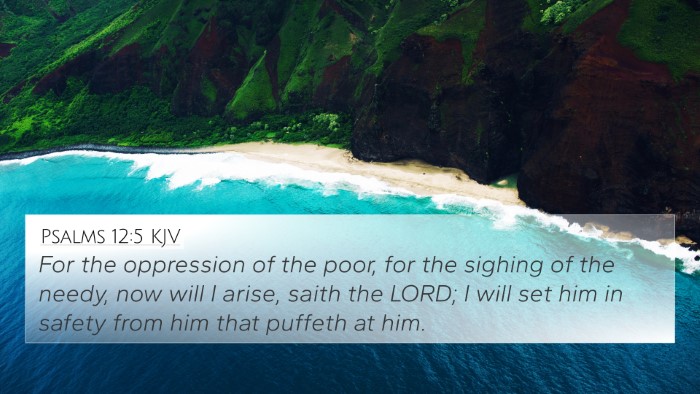
Psalms 12:5 (KJV) »
For the oppression of the poor, for the sighing of the needy, now will I arise, saith the LORD; I will set him in safety from him that puffeth at him.
Job 20:19 Verse Analysis and Similar Verses
Understanding Job 20:19
Job 20:19 (ESV): "For he has crushed and abandoned the poor; he has taken a away a house which he did not build."
Context and Summary
In this verse, Zophar, one of Job's friends, is articulating the consequences of wickedness. The overall theme revolves around justice and retribution, as Zophar believes that the rich and powerful who oppress the poor will eventually face divine judgement.
Insights from Public Domain Commentaries
-
Matthew Henry's Commentary:
Henry explains that this verse reflects on the moral fabric of society, highlighting how those who oppress the poor are ultimately on a path to destruction. He points out that Zophar's accusations serve to remind Job that injustice does not go unpunished. The idea is that those who take advantage of others shall find themselves bereft of their gains.
-
Albert Barnes' Notes:
Barnes emphasizes the vivid metaphor of "crushed and abandoned" to represent the despair of the poor due to the actions of the wealthy. He notes that the reference to a house that was "not built" illustrates that the material wealth acquired through nefarious means is insecure. Such wealth is ultimately hollow and subject to divine judgment.
-
Adam Clarke's Commentary:
Clarke discusses the social implications of this statement, recognizing that it serves as a warning against exploitation. He connects this to the biblical imperative to care for the poor, indicating a broader theological claim about the care God has for the marginalized. Clarke suggests that God will not allow the oppressors to stand unpunished for their iniquities.
Bible Verse Cross References
This verse connects to various other scriptures that reinforce its teachings:
- Psalms 37:21: "The wicked borrows and does not pay back, but the righteous is gracious and gives."
- Proverbs 14:31: "Whoever oppresses a poor man insults his Maker, but he who is generous to the needy honors him."
- James 5:1-3: "Come now, you rich, weep and howl for the miseries that are coming upon you."
- Isaiah 10:1-2: "Woe to those who decree iniquitous decrees, and the writers who keep writing oppression."
- Lamentations 3:34-36: "Denying justice to a man in the court of the Most High."
- Matthew 7:2: "For with the judgment you pronounce you will be judged, and with the measure you use it will be measured to you."
- Ecclesiastes 5:8: "If you see in a province the oppression of the poor and the violation of justice and righteousness..."
Comparative Bible Verse Analysis
The theological implications of Job 20:19 resonate through both the Old and New Testaments. Not only does this verse reflect an understanding of divine justice, but it also connects with Christ's teachings on wealth and judgment:
- Linking with Romans 12:19: "Beloved, never avenge yourselves, but leave it to the wrath of God, for it is written, 'Vengeance is mine, I will repay, says the Lord.'"
- Thematic Connection with Luke 6:20-23: The Beatitudes highlight the special place that the poor and oppressed hold in God's kingdom.
- Parallels to 1 Timothy 6:9: "But those who desire to be rich fall into temptation, into a snare..."
- Scriptural Cross-referencing with Micah 6:8: "He has told you, O man, what is good; and what does the Lord require of you but to do justice, and to love kindness..."
Inter-Biblical Dialogue
The themes explored in Job 20:19 prompt readers to consider the broader narrative of justice within scripture, particularly the consequences of social injustice. Other passages reinforce the idea that God closely monitors the actions of humanity, especially concerning the vulnerable.
Conclusion
The exploration of Job 20:19 reveals critical insights into the nature of divine justice, the treatment of the poor, and the inevitable downfall of those who partake in oppression. Through comparative Bible verse analysis, one can see how this verse informs and is informed by other scriptures, enhancing our understanding of God's expectations for society.
Using Cross-References Effectively
For those studying the Bible, tools for cross-referencing and understanding interconnections between verses are invaluable. By utilizing a Bible concordance or a cross-reference Bible study guide, readers can uncover deeper meanings and develop their spiritual insights.
Tips for Further Study
- Utilize a Bible concordance to find cross-references.
- Explore commentaries on difficult passages to gain insight.
- Engage in thematic studies to find links between verses.
- Consider cross-referencing Old and New Testament teachings.
